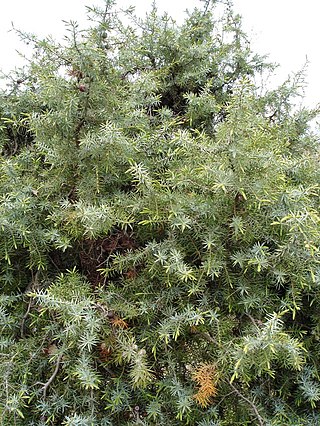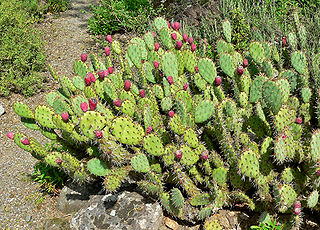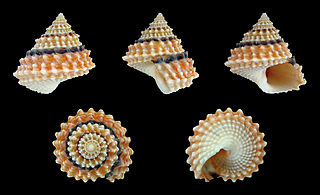| Prickly Heat | |
|---|---|
| Also known as | Prickly Heat Global Epidemic (2001) |
| Genre | Reality game show |
| Presented by | Julian Clary Davina McCall (1998) Denise Van Outen (2000-1) |
| Country of origin | United Kingdom |
| Original language | English |
| No. of series | 3 |
| No. of episodes | 30 |
| Production | |
| Running time | 60 minutes (inc. adverts) |
| Production company | LWT |
| Original release | |
| Network | Sky One |
| Release | 11 October 1998 – 11 March 2001 |
Prickly Heat is a reality game show broadcast on Sky One from 11 October 1998 to 11 March 2001.
| Series | Start date | End date | Episodes |
|---|---|---|---|
| 1 | 11 October 1998 | 13 December 1998 | 10 |
| 2 | 9 January 2000 | 12 March 2000 | 10 |
| 3 | 4 January 2001 | 11 March 2001 | 10 |

Nopal is a common name in Spanish for Opuntia cacti, as well as for its pads. The name nopal derives from the Nahuatl word nohpalli for the pads of the plant.

Miliaria, commonly known as heat rash, sweat rash, or prickly heat, is a skin disease marked by small, itchy rashes due to sweat trapped under the skin by clogged sweat-gland ducts. Miliaria is a common ailment in hot and humid conditions, such as in the tropics and during the summer. Although it affects people of all ages, it is especially common in children and infants due to their underdeveloped sweat glands.

Zanthoxylum is a genus of about 250 species of deciduous and evergreen trees, shrubs and climbers in the family Rutaceae that are native to warm temperate and subtropical areas worldwide. It is the type genus of the tribe Zanthoxyleae in the subfamily Rutoideae. Several of the species have yellow heartwood, to which their generic name alludes. Several species are cultivated for their use as spices, notably including Sichuan pepper.

Recess: School's Out is a 2001 American animated comedy adventure film based on the Disney television series Recess, and features the voices of Andrew Lawrence, Rickey D'Shon Collins, Jason Davis, Ashley Johnson, Courtland Mead, Pamela Adlon, Dabney Coleman, Melissa Joan Hart, April Winchell, and James Woods.

Juniperus oxycedrus, vernacularly called Cade, cade juniper, prickly juniper, prickly cedar, or sharp cedar, is a species of juniper, native across the Mediterranean region, growing on a variety of rocky sites from sea level. The specific epithet oxycedrus means "sharp cedar" and this species may have been the original cedar or cedrus of the ancient Greeks.

Opuntia ficus-indica, the Indian fig opuntia, fig opuntia, or prickly pear, is a species of cactus that has long been a domesticated crop plant grown in agricultural economies throughout arid and semiarid parts of the world. O. ficus-indica is the most widespread and most commercially important cactus. It is grown primarily as a fruit crop, and also for the vegetable nopales and other uses. Cacti are good crops for dry areas because they efficiently convert water into biomass. O. ficus-indica, as the most widespread of the long-domesticated cactuses, is as economically important as maize and blue agave in Mexico. Opuntia species hybridize easily, but the wild origin of O. ficus-indica is likely to have been in central Mexico, where its closest genetic relatives are found.

The prickly shark is one of the two species of sharks in the family Echinorhinidae, found in the Pacific Ocean over continental and insular shelves and slopes, and in submarine canyons. Bottom-dwelling in nature, it generally inhabits cool waters 100–650 m (330–2,130 ft) deep, but it also frequently enters shallower water in areas such as Monterey Bay off California. This stocky, dark-colored shark grows up to 4.0 m (13.1 ft) long, with two small dorsal fins positioned far back on its body and no anal fin. It is characterized by a dense covering of thorn-like dermal denticles, hence its common name.

Alclometasone is a synthetic corticosteroid for topical dermatologic use, possessing anti-inflammatory, antipruritic, and vasoconstrictive properties.

The prickly dogfish is a poorly known species of dogfish shark in the family Oxynotidae, inhabiting temperate Australian and New Zealand waters. Reaching a length of 75 cm (30 in), this brown to gray shark has a very thick body with a prominent "humpback" and extremely rough skin. It is further characterized by two enormous, sail-like dorsal fins placed relatively close together. Both dorsal fins have a spine embedded mostly within the fleshy leading portion of the fin; the first dorsal spine is tilted forward.

Opuntia engelmannii is a prickly pear common across the south-central and Southwestern United States and northern Mexico. It goes by a variety of common names, including desert prickly pear, discus prickly pear, Engelmann's prickly pear in the US, and nopal, abrojo, joconostle, and vela de coyote in Mexico.

Conolophus pallidus is a species of lizard in the family Iguanidae. It is one of three species in the genus Conolophus and is endemic to Santa Fe Island in the Galapagos.

Neotoma leucodon is a species of rodent in the family Cricetidae. Although originally named from San Luis Potosí, Mexico, as a species by Clinton Hart Merriam, the white-toothed woodrat was long considered to be a synonym of the white-throated woodrat. Molecular data, however, indicate the populations east of the Rio Grande in New Mexico and Trans-Pecos Texas represent a different species than morphologically similar populations west of the river.

Heat illness is a spectrum of disorders due to increased body temperature. It can be caused by either environmental conditions or by exertion. It includes minor conditions such as heat cramps, heat syncope, and heat exhaustion as well as the more severe condition known as heat stroke. It can affect any or all anatomical systems. Heat illnesses include: heat stroke, heat exhaustion, heat syncope, heat edema, heat cramps, heat rash, heat tetany.

Zanthoxylum fagara or wild lime, is a species of flowering plant that—despite its name—is not part of the genus Citrus with real limes and other fruit, but is a close cousin in the larger citrus family, Rutaceae. It is more closely related to Sichuan pepper. It is native to southern Florida and Texas in the United States, and to Mexico, Central America, the Caribbean, and South America as far south as Paraguay. Common names include: lime prickly-ash, wild lime, colima, uña de gato, and corriosa.

Opuntia, commonly called the prickly pear cactus, is a genus of flowering plants in the cactus family Cactaceae, many known for their flavorful fruit and showy flowers. Cacti are well-adapted to aridity, however, they are still vulnerable to alterations in precipitation and temperature driven by climate change. Prickly pear alone is more commonly used to refer exclusively to the fruit, but may also be used for the plant itself; in addition, other names given to the plant and its specific parts include tuna (fruit), sabra, sabbar, nopal from the Nahuatl word nōpalli, nostle (fruit) from the Nahuatl word nōchtli, and paddle cactus. The genus is named for the Ancient Greek city of Opus, where, according to Theophrastus, an edible plant grew and could be propagated by rooting its leaves. The most common culinary species is the Indian fig opuntia (O. ficus-indica).

Tectarius coronatus, common name beaded prickly winkle or coronate prickly-winkle, is a species of sea snail, a marine gastropod mollusk in the family Littorinidae, the winkles or periwinkles. It is the type species of the genus Tectarius and is native to the limestone coasts of islands in the western Pacific Ocean.

Prickly pears include a number of plant species that were introduced and have become invasive in Australia.

The Prickly Pear Cays, sometimes spelt as Prickley Pear Cays, are a small pair of uninhabited islands about six miles from Road Bay, Anguilla, in the Leeward Islands of the Caribbean. They are divided by a narrow boat channel between Prickly Pear East and Prickly Pear West. Prickly Pear Cays were classified as 'wildlands' by the "Eastern Caribbean Natural Area Management Programme" (ECNAMP). In addition, Prickly Pear Cays are one of six marine protected areas of Anguilla.
Miliary fever was a loose medical term used in the past to indicate a general cause of infectious disease that cause an acute fever and skin rashes similar to the cereal grain called proso millet. The term has been used for various local epidemics in previous centuries, and considered synonymous with other diagnoses, including "sweating sickness", "prickly heat", or "Picardy sweat". Wolfgang Amadeus Mozart's death report showed this non-specific, by today's standards, term.

Bar Cala is a Latin American cocktail bar and restaurant in northeast Portland, Oregon's Concordia neighborhood, in the United States. Established in 2022, the business operates from the Northwestern Electric Company – Alberta Substation, a former electrical substation listed on the National Register of Historic Places.